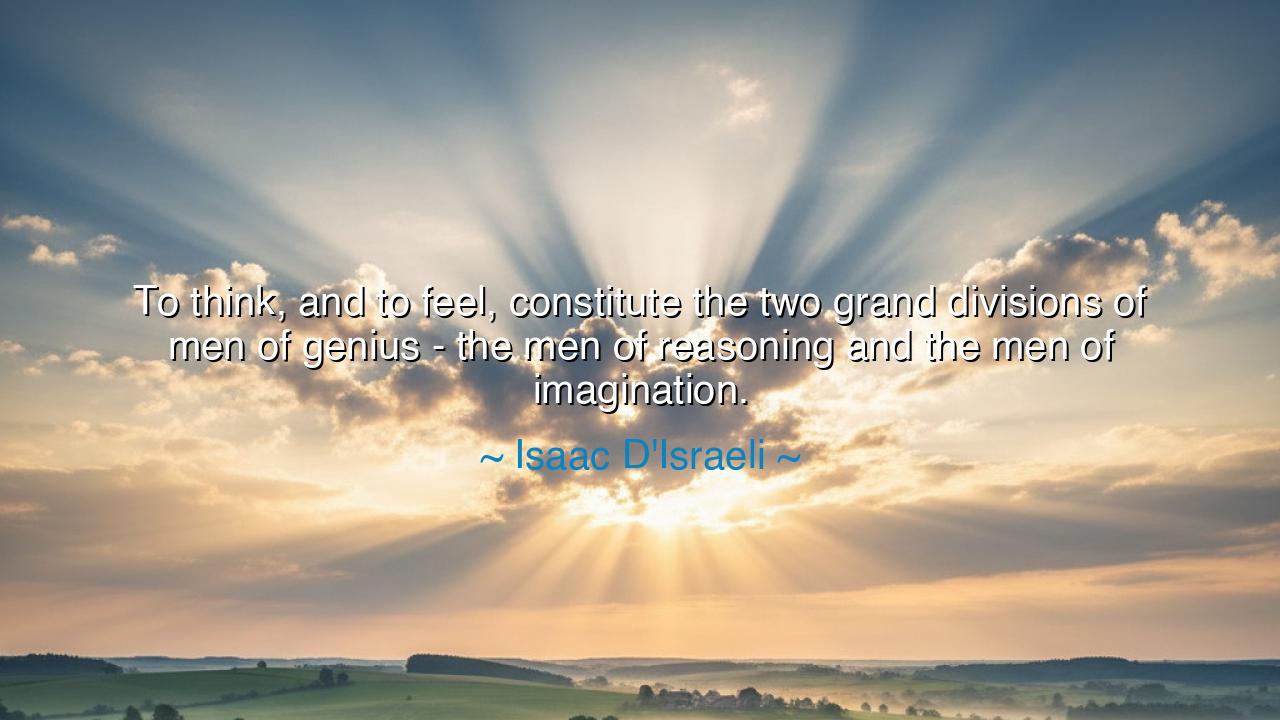
To think, and to feel, constitute the two grand divisions of men
To think, and to feel, constitute the two grand divisions of men of genius - the men of reasoning and the men of imagination.






"To think, and to feel, constitute the two grand divisions of men of genius - the men of reasoning and the men of imagination." These words, spoken by the wise Isaac D'Israeli, offer us a profound insight into the very nature of genius—that mysterious force which moves through the hearts and minds of the great. D'Israeli, in his deep understanding of the human soul, suggests that the genius of a person can be divided into two distinct, yet interconnected realms: the thinkers, who are masters of reason, and the dreamers, who are masters of imagination. The thinkers are those who pierce through the fog of confusion with the clarity of logic and analysis, while the dreamers transcend the limits of reality, lifting humanity with their flights of fancy and the vastness of their creative visions.
To grasp the fullness of this quote, let us reflect upon the great philosophers of antiquity, whose intellects were often consumed with the quest for truth through reason. Aristotle, the master of logic and classification, believed that through reasoning and the application of the mind, we could come to understand the very structure of the universe. In his work, he mapped out the nature of reality, establishing principles that still guide our reasoning today. For Aristotle, thinking was the path to wisdom—the lantern that illuminated the darkened world of uncertainty. He believed that through rational thought, we could elevate the human spirit, finding the principles that governed all things. And so, the men of reasoning, like Aristotle, sought to unravel the threads of reality with the sharpness of their minds.
Yet, there is another kind of genius, the one that does not seek to dissect the world into its components but to create something new, something that transcends the very boundaries of what is known. These are the men and women of imagination, whose ideas spring not from the dry well of logic but from the fertile fields of the soul. Think of the great poets like Homer, whose works were filled with stories of gods and heroes, of love and betrayal, of triumphs and defeats. Homer’s imagination gave birth to entire worlds, and through his verses, he touched the very essence of what it means to be human. Through imagination, Homer gave form to the intangible, the invisible forces that shape our lives. His stories did not merely entertain; they elevated the human spirit, allowing it to soar into realms of beauty and sorrow, where mere reasoning could not tread.
This duality of genius—the rational and the imaginative—is not confined to the ancient world. Consider the life of Leonardo da Vinci, a man who embodied both reasoning and imagination. As a scientist, da Vinci meticulously observed the world, drawing anatomical sketches and studying the principles of flight, the motion of water, the mechanics of human movement. Yet, at the same time, he was an artist whose imagination painted visions of beauty that defied the limits of his time. His masterpieces, such as the Mona Lisa and The Last Supper, were not born merely from observation or calculation; they came from the depths of his visionary mind, where he could see beyond the world as it was and into the world as it could be. Da Vinci exemplifies D'Israeli’s division of genius, for he did not merely think or feel—he did both, and in doing so, he transformed the very fabric of human achievement.
D'Israeli’s words also remind us of the balance that must be struck between these two grand divisions of genius. For while reasoning allows us to make sense of the world and move toward practical solutions, imagination propels us forward, urging us to dream of new possibilities and new frontiers. Think of the great inventors such as Nikola Tesla, whose brilliant reasoning led him to make discoveries in electricity, yet it was his imagination that saw the possibilities of a world powered by alternating currents and wireless communications. Tesla did not merely seek to understand the world—he sought to change it, to create a new world, and it was his imagination that led him to do so.
The lesson we draw from D'Israeli’s words is one of integration. As humans, we are not limited to either reason or imagination alone. We are capable of both, and when these two forces come together, they create a synergy that drives the greatest achievements. In our own lives, we are called not to choose between reason and imagination but to find a way to use both in harmony. As thinkers, we must seek to understand the world through reason and analysis, but as creators, we must allow our imagination to soar, to see beyond the limitations of what is known and into the realms of what could be.
Let us, therefore, take this wisdom into our own lives. Strive to cultivate both the rational and the creative within yourself. Apply reason to solve problems and to navigate the complexities of life, but do not let the boundaries of logic imprison your vision. Allow yourself the freedom to dream, to imagine what might be, and to create without fear of the impossible. For it is through the union of thinking and feeling—of reason and imagination—that we unlock the true potential of the human spirit, and in doing so, we find our place in the grand tapestry of human achievement.






AAdministratorAdministrator
Welcome, honored guests. Please leave a comment, we will respond soon